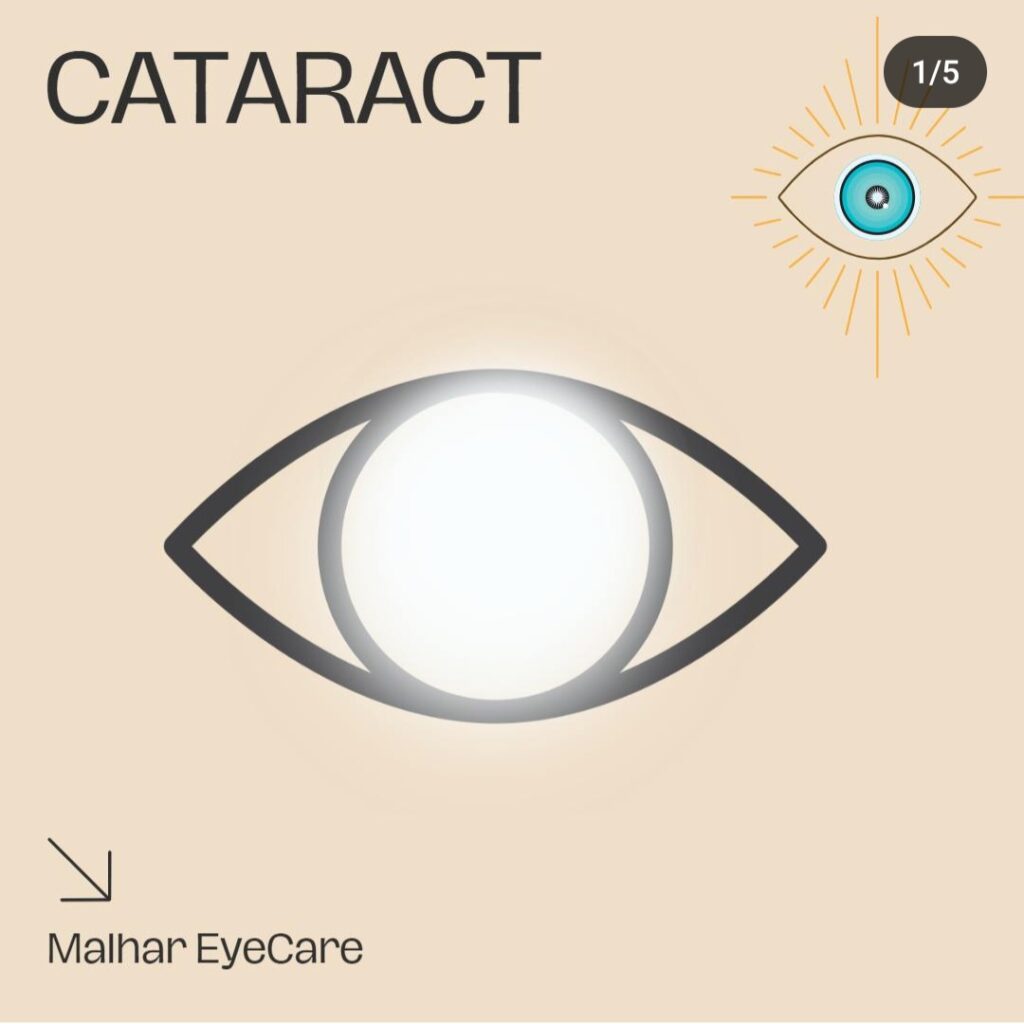Cataract Eye Surgery: Everything You Need to Know

Cataracts are a common condition that affects many people worldwide, particularly as they age. A cataract is a clouding of the eye’s natural lens, which is essential for focusing light onto the retina. The retina then transmits these images to the brain for interpretation. When a cataract forms, it blocks or scatters light as it enters the eye, leading to blurred vision or even blindness. At Malhar Eye Care, Dr. Supriya Pendke offers advanced cataract eye surgery to restore clear vision and help patients enjoy life to the fullest.
What Are Cataracts?
A cataract is a cloudy area that develops in the lens of the eye, and it can form at any age. For normal vision, the lens of the eye must remain clear, allowing light to pass through and focus on the retina. The retina then sends the visual information to the brain, where the images are processed.
However, when a cataract forms, it interferes with this process, either by blocking light or by scattering light beams. This results in picture distortion, often causing blurred or dimmed vision. In severe cases, cataracts can even lead to blindness if left untreated. Cataract eye surgery at Malhar Eye Care becomes necessary when this clouding starts to interfere with daily activities such as reading or driving.
Symptoms of Cataracts
Cataracts tend to develop slowly, so you might not notice any symptoms at first. However, as the condition progresses, you may experience several signs that indicate cataract formation:
- Cloudy, blurry, or dull vision.
- Increasing difficulty with night vision.
- Sensitivity to bright lights and glare.
- Requiring brighter lighting for reading or other tasks.
- Seeing halos around lights, particularly at night.
- Frequent changes in eyeglass or contact lens prescriptions.
- Fading or yellowing of colors.
- Double vision in one eye.
These symptoms can significantly reduce the quality of life, making even simple tasks challenging. This is when many people start considering cataract eye surgery at Malhar Eye Care to restore their vision.
Risk Factors for Cataracts
Several risk factors can contribute to the development of cataracts. While aging is the most common cause, other factors include:
- Aging: Cataracts are most commonly associated with getting older. The condition often begins to develop after age 40 and can become more severe with time.
- Diabetes: People with diabetes are at higher risk of developing cataracts earlier in life.
- Sunlight Exposure: Prolonged exposure to UV rays can increase the chances of cataract formation.
- Smoking: Smoking contributes to the development of cataracts by promoting oxidation in the eye’s lens.
- Obesity: People who are overweight or obese are more prone to cataracts.
- High Blood Pressure: Elevated blood pressure can contribute to the early onset of cataracts.
- Previous Eye Injury or Surgery: Any trauma or surgery involving the eye can increase the risk of cataracts.
How Cataracts Affect Vision?
Cataracts develop gradually, often over the course of years. At first, the clouding of the lens may not cause noticeable vision problems, but as the cataract grows larger, it begins to affect the quality of your sight. One common complaint from cataract patients is difficulty seeing at night, which often leads to halos around headlights and streetlights. Cataracts can also make bright light uncomfortable, a condition known as photophobia.
As cataracts worsen, they can begin to dull colors and reduce contrast sensitivity, making the world appear less vibrant and more faded. This can make reading and other tasks that require fine detail challenging. Fortunately, cataract eye surgery at Malhar Eye Care can restore this lost clarity.
Treatment Options for Cataracts
Cataracts are not preventable, but they are treatable. If you have mild cataracts, you might not need treatment right away. Your doctor, Dr. Supriya Pendke, may recommend stronger prescription glasses or other visual aids to help manage the symptoms. However, when cataracts begin to significantly impact your daily life, cataract surgery becomes the best option.
What Is Cataract Eye Surgery?
Cataract eye surgery is a procedure to remove the cloudy lens and replace it with a clear artificial lens, known as an intraocular lens (IOL). This surgery is highly effective and commonly performed around the world. In fact, it’s one of the most frequent and successful surgeries in modern medicine.
During cataract eye surgery at Malhar Eye Care, Dr. Supriya Pendke makes a small incision in the eye and uses ultrasound waves to break up the cloudy lens. The lens fragments are then removed, and the new artificial lens is implanted. The procedure usually takes about 15-20 minutes and is done on an outpatient basis, meaning you can go home the same day.
When Should You Consider Cataract Eye Surgery?
Deciding when to have cataract surgery depends on how much your cataracts are affecting your vision and quality of life. Most doctors recommend surgery when:
- Your vision has become blurred or dim, and glasses no longer help.
- You have trouble with daily tasks such as reading, driving, or watching TV.
- You experience difficulty seeing at night or are sensitive to glare.
- Your cataracts are interfering with your ability to enjoy activities such as hobbies or social events.
Your eye doctor, Dr. Supriya Pendke, will work with you to determine the right time for surgery. Most people don’t need to rush the decision since cataracts typically progress slowly. However, if you have certain conditions like diabetes, high blood pressure, or obesity, cataracts may worsen more quickly, and surgery may be recommended sooner.
The Benefits of Cataract Eye Surgery
The primary benefit of cataract eye surgery at Malhar Eye Care is the restoration of clear vision. Many patients report seeing colors more vividly and experiencing a significant improvement in their overall quality of life. Some of the benefits include:
- Improved vision clarity.
- Enhanced color perception.
- Better night vision and reduced glare.
- Reduced dependency on glasses or contact lenses.
- Increased ability to perform daily tasks.
Recovery After Cataract Eye Surgery
Recovery from cataract eye surgery is usually quick and uncomplicated. Most patients notice an improvement in their vision within a few days, though it may take a few weeks for full recovery. During this time, your eye doctor, Dr. Supriya Pendke, will provide specific instructions to care for your eyes, such as:
- Avoiding strenuous activity for a few days.
- Using prescribed eye drops to prevent infection and reduce inflammation.
- Wearing a protective shield or sunglasses to avoid irritation from bright light.
Preventing Cataracts and Maintaining Eye Health
While cataracts cannot always be prevented, certain lifestyle changes can help maintain good eye health and slow the progression of cataracts. Some helpful tips include:
- Wear Sunglasses: Protect your eyes from harmful UV rays by wearing sunglasses that block 100% of UVA and UVB light.
- Quit Smoking: Smoking increases the risk of developing cataracts, so quitting can help protect your vision.
- Maintain a Healthy Diet: Foods rich in antioxidants, such as leafy greens, fruits, and nuts, can promote good eye health.
- Control Health Conditions: Managing conditions like diabetes and high blood pressure can reduce the risk of cataract formation.
- Regular Eye Exams: Regular check-ups with Dr. Supriya Pendke at Malhar Eye Care can help catch cataracts early and monitor your eye health.
Conclusion
Cataracts are a common condition, especially as we age, but they don’t have to diminish your quality of life. Cataract eye surgery at Malhar Eye Care is a safe and effective solution that can restore clear vision and help you enjoy life to the fullest. If you’re experiencing symptoms of cataracts, such as blurred vision or difficulty seeing at night, consult Dr. Supriya Pendke to determine the best course of action. With timely treatment, you can regain your vision and protect your eye health for the future.
